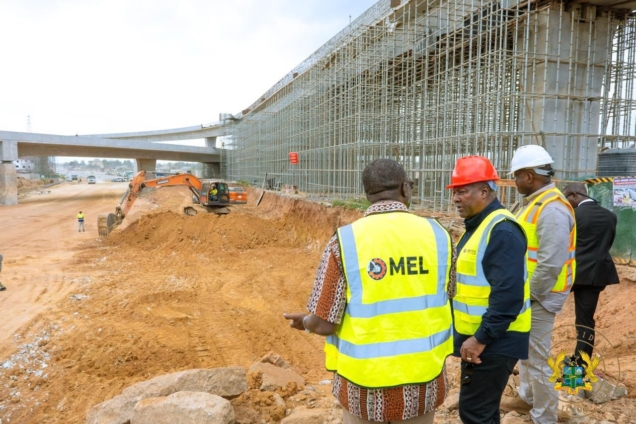On Wednesday, September 3, 2025 President John Dramani Mahama inspected the ongoing rehabilitation works on the Ofankor–Nsawam stretch of the Accra–Kumasi highway, a critical link between Ghana’s two largest cities.
The 33.4-kilometre project, part of the National Route 6, had stalled due to funding gaps, worsening the plight of thousands of commuters. However, with a supplementary payment of US$78 million released by government, work has resumed around the clock and progress currently stands at 75 percent.
When completed, the project will boast a three-tier interchange at Amasaman, overpasses at Pobiman and Medie, an underpass with a roundabout at Nsawam junction and nine pedestrian crossings. Originally scheduled for completion in 2024, the deadline was extended to May 2025, but President Mahama has urged the contractor to fast-track work and meet a revised target of the second quarter of next year.
During his visit, the President expressed concern about previous funding lapses despite the existence of a loan facility, pledging that his government’s ‘Big Push’ infrastructure initiative will provide liquidity for uninterrupted work. He also emphasised the need for proper site management to ensure traffic flows smoothly during construction.
This project, valued at US$346.5 million and undertaken by Maripoma Enterprise Limited, is expected to ease congestion, reduce travel time, stimulate socio-economic activity and facilitate trade between Ghana and its Sahelian neighbours, once completed.
First of all, the President’s decision to personally inspect the Ofankor–Nsawam highway rehabilitation works deserves commendation. Too often, leaders delegate such oversight to subordinates, leaving the public to wonder whether those in charge truly appreciate the daily struggles of ordinary Ghanaians.
The Ofankor–Nsawam stretch is not just another road. It is the main artery connecting the capital to Kumasi and by extension northern Ghana and beyond. Delays in its rehabilitation not only inconvenience commuters but also hamper trade and increase transportation costs. In this light, the President’s insistence that contractors speed up work is more than rhetoric, it is a necessity.
That said, it is not enough to issue directives. The government must back words with consistent action. Funding gaps that previously halted the project must never be repeated. The release of US$78 million to get works back on track is commendable, but it must not be the last financial intervention. Infrastructure projects of this scale demand timely payments, effective supervision and transparent accountability.
Another critical point raised by the President is site management. Commuters should not have to endure chaotic diversions, dust and gridlock simply because work is ongoing. The contractor must prioritize traffic flow and pedestrian safety while delivering on timelines. Ghana’s infrastructure drive must be people-centered, ensuring that the very citizens meant to benefit from projects are not unduly burdened during execution.
We also echo the President’s concerns about the financing of this project. How was a loan secured yet no funds made available to pay contractors initially? This inconsistency points to systemic lapses that must be corrected. Transparency in project financing builds public trust and ensures that taxpayers’ money is not lost in bureaucratic inefficiency.
Ultimately, when completed, the Ofankor–Nsawam road promises to transform daily commuting, boost economic productivity, and strengthen Ghana’s position as a trade hub in the sub-region. The challenge now is to ensure deadlines are met and promises are kept.









